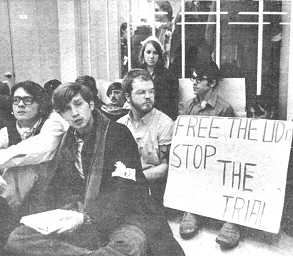On January 22 the usually quiet and staid University of Detroit joined the ’70s as police arrested 17 students who were protesting the presence of a Navy recruiter on campus.

The students, who began a non-violent, non-disruptive sit-in at the University’s Placement Center, refused to leave when ordered to by Dean for Student Affairs, Fred Shadrick. Then, as the headline of the U-D Varsity News put it, “Fred Calls Cops” and the Tactical Mobile Unit, a police riot bus and a paddy wagon took the students away.
This was in complete contradiction to the Administration guidelines that had just been issued on student protests that calls for consultation with the student government before the police are called on campus.
The students were arraigned before Recorder’s Court Judge Joseph Gillis, a U-D alumnus, who demanded that the defendants be tried the following morning despite the plea of defense attorneys that they would need several weeks to prepare for the case.
The following morning the attorneys for the defense renewed their pleas for an adjournment; but were overruled by judge Gillis, who was fast flipping out over the case. First, he found a spectator in contempt of court for applauding a defense motion. Then another for moving his lips when a sound came from his general direction and even though one of the defendants, Owen Love, admitted he had made the noise.
Love was later found in contempt for another incident along with a woman spectator that the judge spotted whispering. The detention box was filling up.
James Lafferty, for the defense, began to make a motion, but the Judge told him to sit down.
MR. LAFFERTY: But your honor I haven’t made my motion.
THE COURT: Sit down, Mr. Lafferty.
MR. LAFFERTY: I have a motion to bring before this court.
THE COURT: Lock him up.
It was beginning to look and sound like the Conspiracy Case in Chicago. By now it was evident to all that da judge had gone out in the zone. Lawyers from other courtrooms began streaming in to see the spectacle. The press began to arrive. The president of the Detroit Bar Association came over to observe the proceedings.
The audience began to chant “OM” and whispers of “fascist” and “pig” came from the spectators’ gallery, but the judge seemed not to hear. He knew he had blown it and finally relented to the defense and gave them a week to prepare their case.
After court, back at the University, 200 angry U-D students confronted Dean Shadrick and University President Fr. Malcolm Carron with the charge that the school shared complicity with Judge Gillis’ kangaroo court. Shadrick appeared visibly shaken by his exposure to the type of justice that goes down every day in the neon oven on Clinton street.
Lafferty said he wanted to clarify the fact that the University could drop the charges if it wanted. “Now the judge might say to you, I won’t let you do this. You’ve burdened the tax-payers to the tune of a hundred dollars,” he said.
Lafferty then offered to pay the money out of his own pocket if the University wouldn’t. Shadrick and Carron both stood there saying nothing as 200 students cheered.
“It is not out of your hands.” he continues. “You ought to have the gumption, the Christian decency to say in court we don’t want to be associated with this. If you don’t have the decency to do this, I don’t give a damn about your rules and regulations.” More cheers as the two administrators left to consider the students’ demands.
The week of Jan. 26 saw a series of sit-ins to demand the dropping of charges against the accused 17. The campus was a flurry of student and administration meetings with little coming out of any of them until the University finally agreed to attempt to drop the charges. The demand for an end to military recruiting on campus fell by the wayside.
The students and their attorneys were back in Judge Gillis’ court room on Jan. 30 where he announced that he did not have proper jurisdiction to try the case and that it would be assigned to another judge.
The trials are set to begin shortly, but what is most important is the effect of the demonstrations on both the protesters and the school itself. One suspects that U-D will never be the same again.
